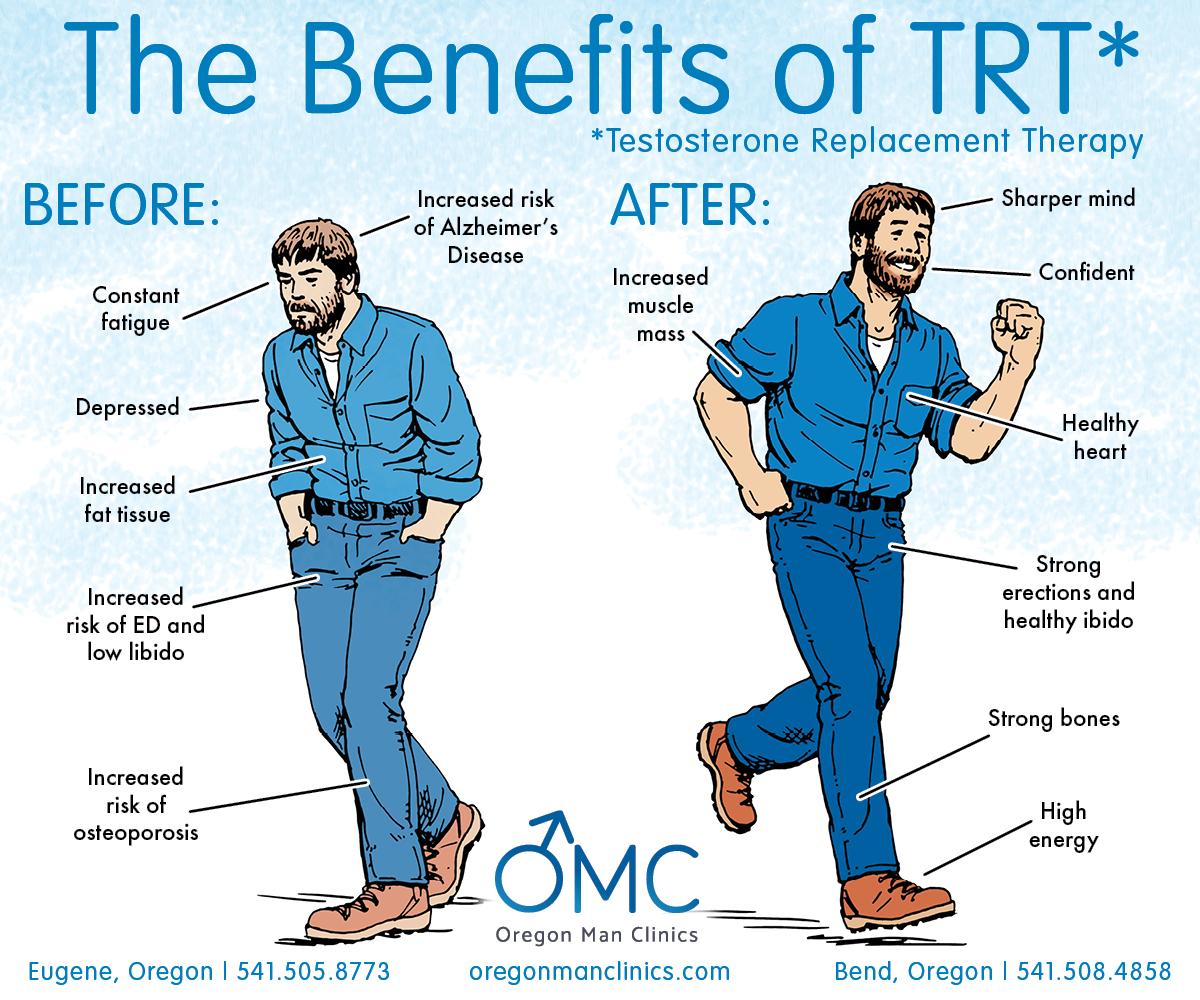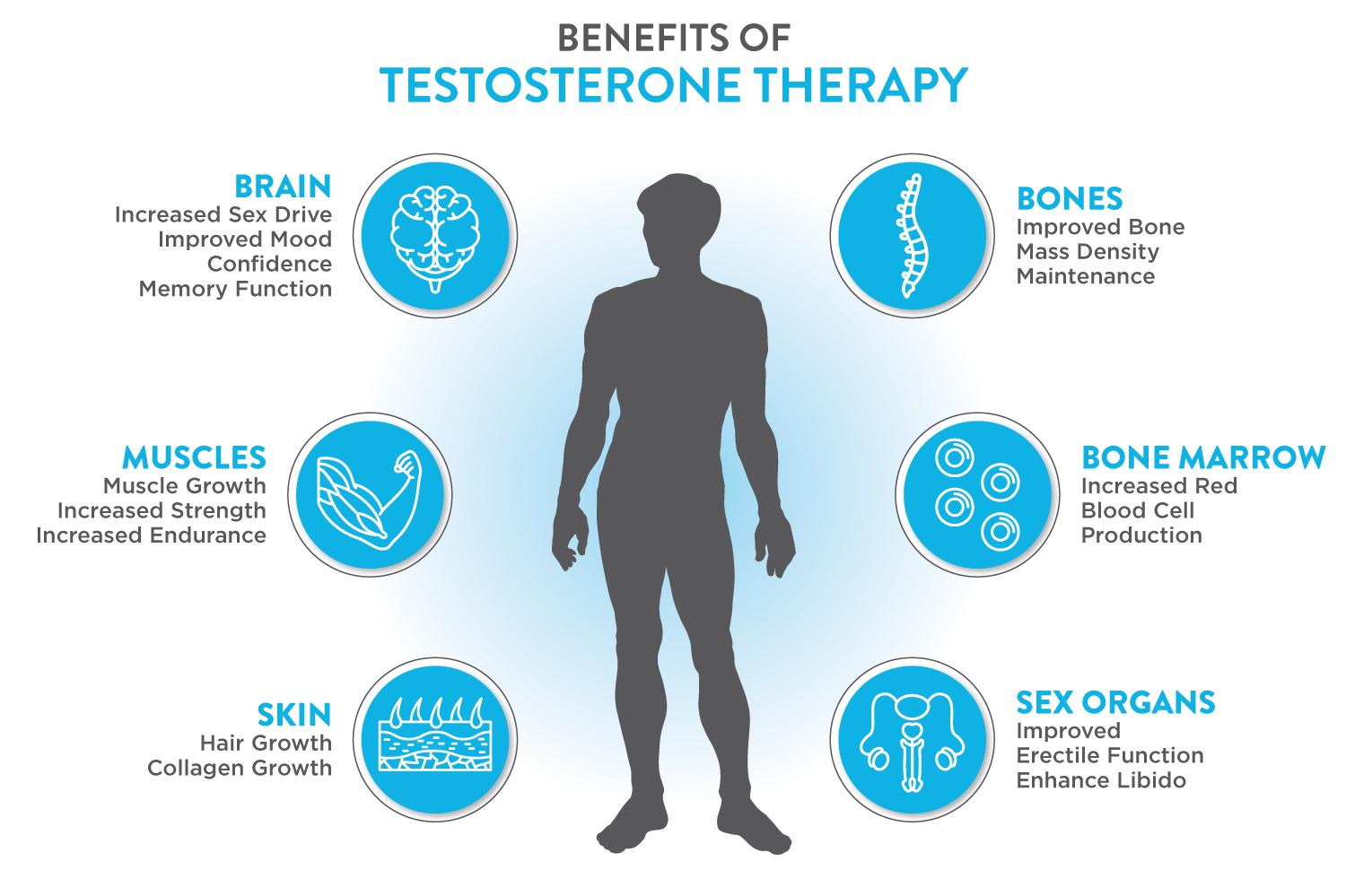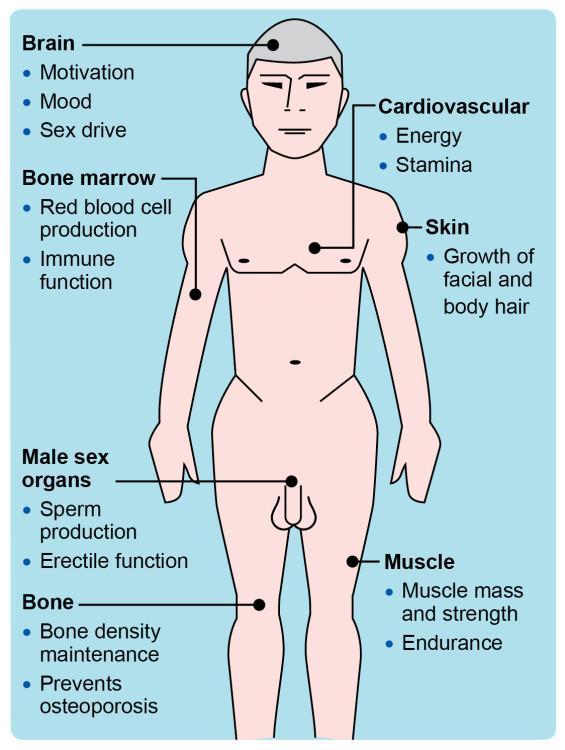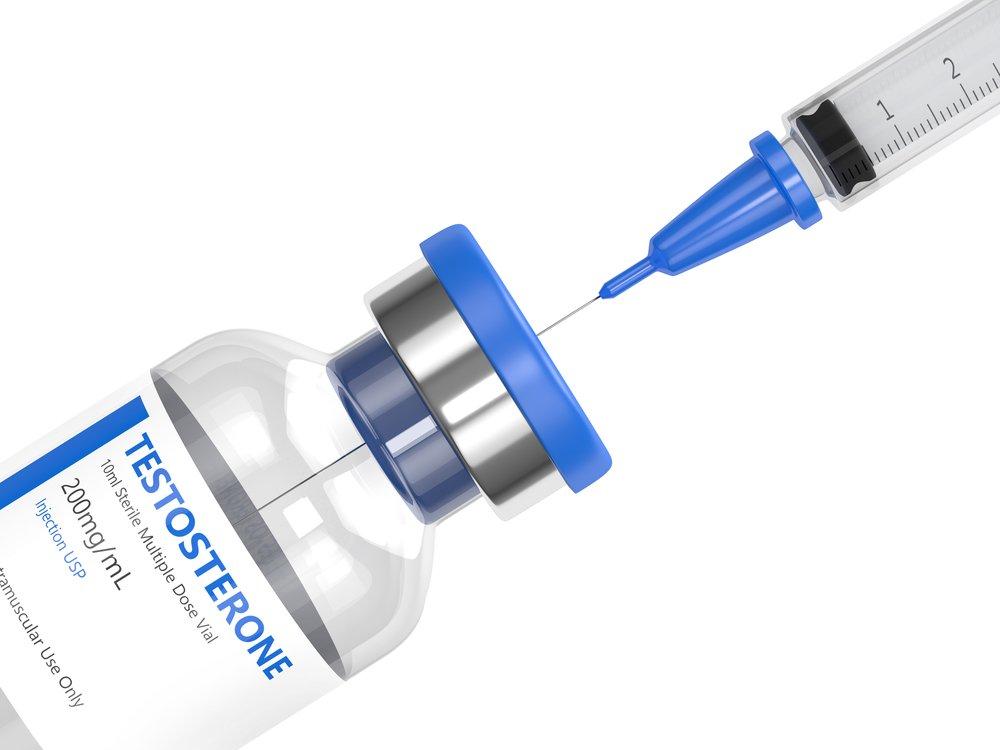In an era where mental acuity is often equated with success, the quest for cognitive sharpness has never been more pronounced. Amidst the cacophony of diets, supplements, and brain-training apps, a more nuanced contender has emerged—testosterone therapy. Traditionally associated with physical vigor and vitality, testosterone’s role in cognitive function is gaining attention, prompting scientific scrutiny and public interest alike. As research unearthed intriguing connections between hormone levels and mental performance, many are left pondering: can boosting testosterone truly sharpen our cognitive edge? This article delves into the evolving landscape of testosterone therapy, exploring its potential benefits, the science behind its effects on cognitive function, and the implications for those seeking to enhance their mental sharpness. Join us as we navigate this compelling intersection of endocrinology and neuroscience, and consider whether hormone therapy could be the key to unlocking a clearer, sharper mind.
Understanding the Link Between Testosterone and Cognitive Function
Testosterone, a hormone traditionally associated with physical attributes, plays a crucial role in various cognitive functions. Its influence on the brain is evidenced by studies indicating a strong correlation between testosterone levels and mental agility. For instance, higher testosterone concentrations have been linked to improvements in memory, attention, and spatial abilities. Some researchers suggest that testosterone may help modulate neurotransmitter systems, fostering communication between neurons and ultimately enhancing cognitive processing speed.
The potential cognitive benefits of testosterone therapy are particularly intriguing for aging populations. As testosterone levels naturally decline with age, so may cognitive faculties. An array of preliminary studies indicates that testosterone therapy could mitigate these cognitive declines, offering a possible avenue for maintaining mental sharpness. However, the relationship between testosterone and cognitive function is complex and multifaceted, necessitating further research to ascertain optimal treatment protocols. Key areas of interest include:
- The impact of dosage: Understanding effective testosterone levels for cognitive benefits.
- Age factors: Differentiating effects in younger versus older individuals.
- Long-term implications: Assessing the safety and sustainability of testosterone therapy on cognitive health.

Exploring the Benefits of Hormone Replacement Therapy
The journey toward cognitive sharpness often involves various interventions, and one increasingly explored option is the use of testosterone therapy. Research indicates that maintaining optimal testosterone levels may play a pivotal role in enhancing cognitive functions, particularly as we age. Benefits of this therapy include:
- Improved Memory: Participants in studies have reported enhanced short-term and long-term memory retention.
- Increased Focus: Higher testosterone levels have been linked to better concentration and task responsiveness.
- Boosted Mood: Hormone therapy can contribute to emotional well-being, reducing anxiety and depressive symptoms which can cloud cognitive clarity.
While the benefits can be enticing, it is crucial to approach hormone replacement therapy with careful consideration and medical guidance. Effectiveness varies from person to person, and potential side effects must be evaluated. The following table summarizes common aspects to consider:
| Aspect | Considerations |
|---|---|
| Eligibility | Age, health status, and testosterone levels |
| Benefits | Cognitive sharpness, memory, mood enhancement |
| Risks | Potential hormonal imbalance, side effects |
| Consultation | Essential for personalized therapy |

Identifying Symptoms of Low Testosterone and Cognitive Decline
Recognizing the signs of decreased testosterone levels is crucial for maintaining overall well-being, especially as it can have profound implications on cognitive health. Common indicators include a noticeable reduction in energy levels, often described as persistent fatigue or lethargy, and mood fluctuations, such as increased irritability or anxiety. Additionally, men might experience diminished libido or erectile dysfunction, which can also serve as red flags. Other symptoms to watch for include:
- Memory issues: Difficulty recalling information or concentrating on tasks.
- Physical changes: Increased body fat or muscle mass loss.
- Sleep disturbances: Experiencing insomnia or disrupted sleep patterns.
As testosterone levels drop, cognitive decline can sometimes follow, creating a challenging cycle that affects daily functioning. It’s essential to differentiate between normal aging and symptoms caused by hormonal imbalances. A comprehensive assessment may include both psychological evaluations and blood tests to measure hormone levels. Consider the following table for a quick overview of how low testosterone can manifest cognitively:
| Cognitive Symptom | Possible Cause |
|---|---|
| Difficulty concentrating | Low testosterone affecting cognitive function |
| Memory lapses | Declining hormone levels |
| Increased confusion | Imbalance impacting cognitive clarity |

Evaluating the Science Behind Testosterone and Mental Acuity
The relationship between testosterone and mental acuity has been the subject of numerous studies, leading to a growing interest in how testosterone therapy might enhance cognitive functions. Research indicates that testosterone can impact several cognitive domains, including memory, attention, and executive function. Some studies suggest that higher levels of testosterone correlate with improved performance in tasks requiring quick thinking and problem-solving, making it a focal point for those experiencing cognitive decline. However, the science is complex and often confounded by variables such as age, baseline hormone levels, and overall health status.
In evaluating the potential of testosterone therapy for cognitive sharpness, it is critical to recognize the multifaceted nature of cognitive health. Key factors include:
- Age – Testosterone levels naturally decline with age, potentially affecting cognitive abilities.
- Comorbidities - Conditions like obesity and diabetes can also influence cognitive function.
- Lifestyle – Diet, exercise, and mental engagement play significant roles in maintaining mental acuity.
To illustrate the varying impacts of testosterone on cognitive health, consider the following table:
| Testosterone Levels | Cognitive Performance |
|---|---|
| Low | Impaired memory and focus |
| Normal | Adequate mental acuity and problem-solving ability |
| High | Improved processing speed but potential mood swings |
Thus, while testosterone therapy may hold promise for some individuals looking to enhance their cognitive sharpness, it must be approached with careful consideration of individual differences and health contexts.
Safe Administration: Dosage and Methods of Testosterone Therapy
Understanding the appropriate dosage and administration methods for testosterone therapy is crucial to maximizing cognitive benefits while minimizing potential side effects. Typically, practitioners assess individual needs based on factors such as age, weight, and health status. Dosages are often tailored specifically for the patient’s requirements and can range broadly, from 100 mg to 300 mg per week. It’s essential for patients to undergo regular blood tests to monitor testosterone levels, ensuring they fall within the therapeutic range. This vigilance helps in adjusting dosages as necessary, promoting optimal cognitive enhancements without inviting the risks associated with over-treatment.
There are several administration methods available for testosterone therapy, each with its own advantages and considerations. Common methods include:
- Intramuscular Injections: Administered every 1 to 4 weeks, these injections deliver testosterone directly into the muscle, offering rapid absorption.
- Transdermal Patches: These patches provide a steady release of testosterone over a 24-hour period, allowing for convenient daily application.
- Gels and Creams: Topical applications that are rubbed into the skin, providing flexibility in usage while allowing for easy dosage adjustments.
- Pellets: Small pellets implanted under the skin, releasing testosterone gradually over several months, reducing the frequency of administration.
Below is an overview table comparing these methods:
| Method | Administration Frequency | Pros | Cons |
|---|---|---|---|
| Intramuscular Injections | Every 1-4 weeks | Rapid absorption | Requires visits for injections |
| Transdermal Patches | Daily | Convenient, steady release | May cause skin irritation |
| Gels and Creams | Daily | Easy to adjust dosage | Requires careful application |
| Pellets | Every 3-6 months | Long-lasting, low maintenance | Surgical implant needed |
Lifestyle Strategies to Enhance Cognitive Sharpness Alongside Therapy
Incorporating specific lifestyle strategies can significantly contribute to enhancing cognitive sharpness, especially when combined with testosterone therapy. Regular exercise boosts blood flow and oxygen to the brain, fostering improved memory and learning capabilities. Aim for at least 150 minutes of moderate aerobic activity each week. Additionally, consider engaging in activities that challenge your mind, such as puzzles, reading, or learning a new language. These practices help to strengthen neural connections and improve overall cognitive function.
Nutrition plays a vital role in sustaining mental acuity alongside therapy. Focus on a balanced diet rich in antioxidants, omega-3 fatty acids, and vitamins. Including items such as leafy greens, berries, fatty fish, and nuts can provide the necessary nutrients to boost brain health. Here’s a quick reference table to get you started on nutrient-rich foods that support cognitive function:
| Food | Key Nutrients |
|---|---|
| Blueberries | Antioxidants |
| Salmon | Omega-3 fatty acids |
| Spinach | Vitamins A, C, and K |
| Walnuts | Omega-3 fatty acids |
Navigating Risks and Ethical Considerations in Testosterone Treatment
The pursuit of cognitive sharpness through testosterone therapy introduces a myriad of risks and ethical considerations that warrant careful examination. While some studies suggest potential cognitive benefits such as improved memory and enhanced focus, there are inherent dangers associated with inappropriate usage. Key risks include:
- Hormonal Imbalance: An excess of testosterone can lead to fluctuating hormone levels, disrupting the body’s natural endocrine system.
- Cardiovascular Issues: Increased testosterone can elevate red blood cell count, leading to heightened blood pressure and potential heart complications.
- Mood and Behavioral Changes: Some users may experience aggression or mood swings, which can impact personal and professional relationships.
Amid these risks, ethical considerations must also be addressed, particularly concerning informed consent and the pressure to enhance cognitive abilities. The landscape of testosterone therapy raises critical questions about:
- Pressure to Perform: The societal expectation to be constantly productive may drive individuals toward unregulated use of testosterone.
- Equity in Access: Not everyone has equal access to safe and legitimate testosterone therapy, risking disparities in cognitive enhancement.
- Long-term Effects: The long-term implications of testosterone therapy are still being studied, necessitating ongoing ethical evaluation as we navigate these uncharted waters.
Q&A
Q&A: Exploring Testosterone Therapy for Cognitive Sharpness
Q1: What is testosterone therapy, and how does it relate to cognitive function?
A1: Testosterone therapy involves administering testosterone, a hormone primarily associated with male development, health, and reproduction. Traditionally linked to physical vitality, recent studies suggest that testosterone might also play a role in cognitive processes, influencing areas such as memory, attention, and overall mental clarity.
Q2: Who might consider testosterone therapy for cognitive enhancement?
A2: Individuals, particularly men over the age of 30, may explore this therapy if they experience symptoms of low testosterone, such as fatigue, mood swings, or cognitive decline. However, it’s essential for anyone considering this path to consult with a healthcare professional for personalized advice.
Q3: What does the research say about the effects of testosterone on cognitive sharpness?
A3: Several studies indicate a potential link between testosterone levels and cognitive performance, suggesting that adequate testosterone may enhance certain cognitive functions, particularly spatial ability and memory. However, the research is still evolving, with mixed results, necessitating further exploration to establish a clearer connection.
Q4: Are there risks associated with testosterone therapy?
A4: Yes, testosterone therapy comes with potential risks, including an increased risk of cardiovascular issues, exacerbation of sleep apnea, and other side effects like mood changes or skin reactions. Hence, it’s crucial for individuals to thoroughly discuss these risks with their healthcare providers before initiating therapy.
Q5: Can testosterone therapy benefit women, too?
A5: While testosterone is often viewed through the lens of male health, women also produce testosterone, and emerging research suggests it may play a role in their cognitive health as well. Women experiencing low testosterone levels may benefit from therapy, but it should be approached with caution and under the guidance of a qualified healthcare provider.
Q6: What lifestyle factors can naturally influence testosterone levels?
A6: Many lifestyle choices can impact testosterone levels and, by extension, cognitive sharpness. Regular physical activity, a balanced diet rich in healthy fats, sufficient sleep, and stress management techniques, such as mindfulness or meditation, can all support healthy testosterone levels and enhance overall brain health.
Q7: What’re the next steps for someone interested in testosterone therapy for cognitive sharpness?
A7: The first step is to consult a healthcare professional who specializes in hormone therapy or geriatric medicine. They can perform the necessary blood tests to check testosterone levels and recommend a tailored approach based on individual health needs. It’s essential to weigh the benefits against the risks and ensure a comprehensive understanding of the therapy.
Q8: who should ultimately decide on the use of testosterone therapy?
A8: Ultimately, the decision should be made collaboratively between the individual and a qualified healthcare provider. This partnership ensures that all factors—medical history, symptoms, and possible risks—are carefully considered to make an informed choice about pursuing testosterone therapy for cognitive sharpness.
In Summary
the exploration of testosterone therapy as a potential enhancer of cognitive sharpness reveals a complex interplay between hormone levels and brain function. While the promising findings in some studies warrant further investigation, it is essential to approach this subject with a discerning eye. As we continue to unravel the mysteries of the human brain and its intricate relationship with hormones, individuals considering such interventions should consult medical professionals and weigh the benefits against potential risks. Ultimately, the journey towards cognitive clarity may not lie solely in therapy or supplements, but rather in a holistic approach that encompasses lifestyle, nutrition, and mental engagement. As science marches forward, so too does our understanding of how we can optimize our minds in this ever-evolving landscape of health and wellness.










